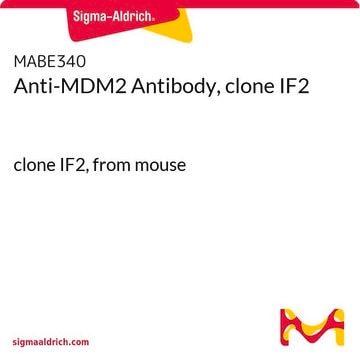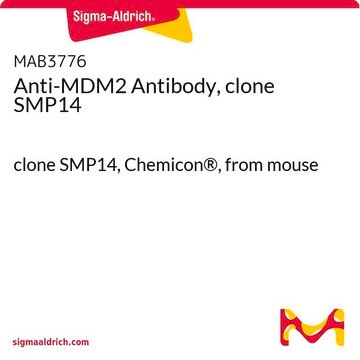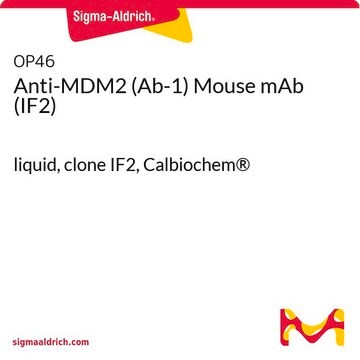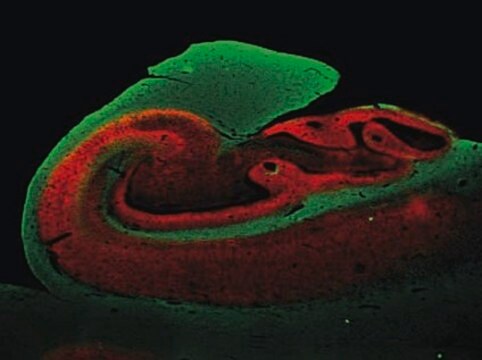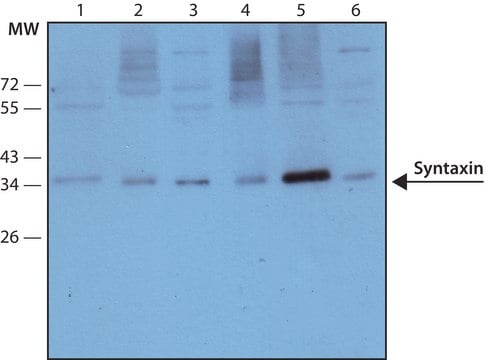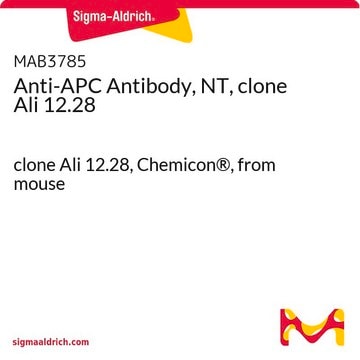MABE331
Anti-MDM2 Antibody, clone 4B2C1.11
clone 4B2C1.11, from mouse
Sinonimo/i:
E3 ubiquitin-protein ligase Mdm2, Double minute 2 protein, Hdm2, Oncoprotein Mdm2, p53-binding protein Mdm2
About This Item
Prodotti consigliati
Origine biologica
mouse
Livello qualitativo
Forma dell’anticorpo
purified immunoglobulin
Tipo di anticorpo
primary antibodies
Clone
4B2C1.11, monoclonal
Reattività contro le specie
human, mouse
tecniche
immunocytochemistry: suitable
immunoprecipitation (IP): suitable
western blot: suitable
Isotipo
IgG1κ
N° accesso NCBI
N° accesso UniProt
Condizioni di spedizione
wet ice
modifica post-traduzionali bersaglio
unmodified
Informazioni sul gene
human ... MDM2(4193)
mouse ... Mdm2(17246)
Descrizione generale
Immunogeno
Applicazioni
Immunocytochemistry Analysis: A representative lot from an independent laboratory detected MDM2 in SV5-tagged, fusion p53-EGFP transfected H1299 cells (Hjerpe, R., et al. (2010). 42(5):725-735.).
Epigenetics & Nuclear Function
Cell Cycle, DNA Replication & Repair
Qualità
Western Blot Analysis: 0.25 µg/mL of this antibody detected MDM2 in 10 µg of mouse brain tissue lysate.
Descrizione del bersaglio
Stato fisico
Stoccaggio e stabilità
Risultati analitici
Mouse brain tissue lysate
Altre note
Esclusione di responsabilità
Not finding the right product?
Try our Motore di ricerca dei prodotti.
Raccomandato
Codice della classe di stoccaggio
12 - Non Combustible Liquids
Classe di pericolosità dell'acqua (WGK)
WGK 1
Punto d’infiammabilità (°F)
Not applicable
Punto d’infiammabilità (°C)
Not applicable
Certificati d'analisi (COA)
Cerca il Certificati d'analisi (COA) digitando il numero di lotto/batch corrispondente. I numeri di lotto o di batch sono stampati sull'etichetta dei prodotti dopo la parola ‘Lotto’ o ‘Batch’.
Possiedi già questo prodotto?
I documenti relativi ai prodotti acquistati recentemente sono disponibili nell’Archivio dei documenti.
Il team dei nostri ricercatori vanta grande esperienza in tutte le aree della ricerca quali Life Science, scienza dei materiali, sintesi chimica, cromatografia, discipline analitiche, ecc..
Contatta l'Assistenza Tecnica.